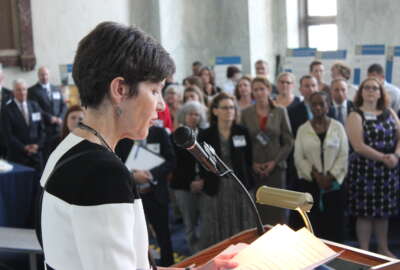

The Veterans Health Administration's Diffusion of Excellence Initiative so far has worked with 3,198 VHA employees to replicate 344 practices, which has resulte...
Best listening experience is on Chrome, Firefox or Safari. Subscribe to Federal Drive’s daily audio interviews on Apple Podcasts or PodcastOne.
The agency whose employees once developed the nicotine patch and invented the cardiac pacemaker has a long history of medical research.
But the Veterans Affairs Department says, despite the common perception that it’s shrouded in bureaucracy and red tape, innovation is still happening at the VA. In fact, it’s thriving.
Pamela Bellino, a patient safety manager at the VA Boston Healthcare System, is making intranasal nalozone, a drug that essentially reverses opioid overdoses, easily accessible in hospitals.
VA Puget Sound Radiologist Beth Ripley is uncovering new uses for 3D printing, which is helping surgeons better prepare and plan for major procedures.
And Thor Ringler, a writer and editor for the VA medical center in Madison, Wisconsin, is interviewing veterans about their lives. He summarizes their stories and includes them in veterans’ medical records, which doctors and nurses say help them better care for their patients.
These employees and others got a standing ovation from their peers at the Veterans Health Administration’s multi-day innovation experience event in Washington last month. About 85 front-line VHA staff members presented their ideas and solicited feedback at the event.
Not all 85 ideas will receive funding or will move forward immediately. Some ideas will need more time for development and testing, but the department said it sees its innovation programs as opportunity to prove that every VA employee is an innovator.
“We are changing the narrative here at VA, and that’s hugely important,” Carolyn Clancy, VHA’s deputy undersecretary for health for discovery, education and affiliate networks, said at the agency’s innovation experience event. “We’re tackling the difficulties of building this innovation culture in our health system head-on,” she said. “What we’re doing is effective, and it works.”
VHA has a multi-pronged network to help employees get their ideas off the ground and then spread those ideas to other VA sites across the country. Through the VHA Innovators Network, staff at 32 VA sites across the country help employees submit their ideas and receive funding to design, develop, test and spread those concepts.
The “spark” stage gives VA employees $5,000-$10,000 to develop an initial proof of concept or prototype for their idea. The “seed” stage helps VA innovators pilot and validate their ideas with up to $50,000. Finally, the “spread” stage gives employees $100,000-$200,000 to scale their innovation to multiple sites.
The VA Diffusion of Excellence initiative identifies best practices and projects that the department can scale and spread throughout the country.
In private sector health care, it takes about 13 years on average to take an idea from mere thought to reality, said Toby Cosgrove, former president and CEO of the Cleveland Clinic, who spoke to the VHA innovators.
So far, the VHA diffusion program has worked with 3,198 VHA employees to replicate 344 practices, which has resulted in cost savings worth about $22.6 million.
“All of us need to be focusing on figuring out how can we speed this up,” Clancy said. “How do we get to a place where every person who serves veterans believes that a core part of their job is improving their job?”
VHA started the innovators network a few years ago, back when the department was emerging from a wait-time crisis. But the program came along at a good time, Clancy said, because it gave VA employees an opportunity to share their ideas and a channel to turn those thoughts into reality.
“That sense of positive momentum was so hugely important to us, and frankly, is hugely important to us still,” Clancy said. “We know that in all health care systems, there is a tendency to cling to the status quo.”
Breaking the status quo has been a goal of the VHA Innovators Network and Diffusion of Excellence initiative. VA employees who have a frustration or see an opportunity to improve even one small piece of their jobs should have an outlet to share their ideas, said Ryan Vega, director of VHA Diffusion of Excellence.
“VA is committed to doing this,” he said. “There’s resources in places. You have 85 front-line VHA staff who are pitching these innovations. That should be a message to the rest of the organization that while it is easy to sometimes to get complacent, while it is easy to get frustrated with a large health system, this work is possible.”
Copyright © 2024 Federal News Network. All rights reserved. This website is not intended for users located within the European Economic Area.
Nicole Ogrysko is a reporter for Federal News Network focusing on the federal workforce and federal pay and benefits.
Follow @nogryskoWFED

